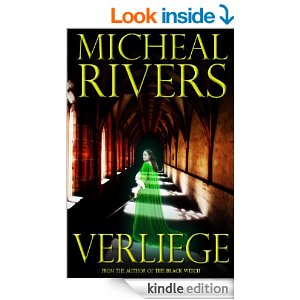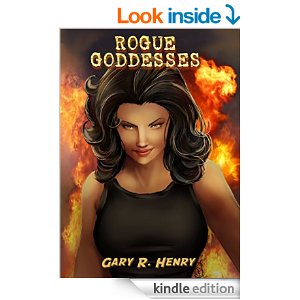Let me begin by saying that writing a novel is a terrific achievement. I know, having written two. My hat is off to anyone who can complete a novel.
That said, here is my honest opinion of Verliege, a story of a haunted castle, by Micheal Rivers.
Characters: If there is a main character in this story, it is the castle Verliege itself, named for its location near the fictional German town of Verliege. A parade of characters, human and spectral, run through its mysterious passageways, grand chambers and secret rooms, each with his or her own point of view, but all are overshadowed by the ancient castle.
One of the most interesting characters is Adrian Bolt, author and historian. As the castle’s most recent owner, Adrian is our entree into Verliege. Convicted of killing his wife while living in the castle, the imprisoned Adrian relates his tale to a psychiatrist, James Pellitere.
Micheal does a nice job with all his characters, defining them through description, dialogue and deed.
Adrian was small in stature, barely reaching five feet nine inches. Adrian’s reputation in James’s field made him larger than the man who sat here now. Nothing about him spoke of being a brave man, or for that matter a calculating killer. The neatly trimmed hair and tailored clothing only added to the air of mystery.
Plot: A congressman recruits psychiatrist James Pellitere to investigate whether historian and writer Adrian Bolt has been wrongly convicted of murdering his wife while the two lived in Verliege castle. While interviews with Bolt provide tantalizing clues to what happened in the haunted halls of the castle, the answers can only be found in a visit to the castle itself.
Setting: The setting is an ancient castle outside the fictional German town of Verliege. Here’s the town as described by Adrian in his talks with James.
“The village of Verliege is a sleepy little village straight out of a fairy tale. The streets are very clean and remind you of a roost for peasants during the days of feudal lords. Many of the houses date back to the early sixteen hundreds. The architecture is very hard to define. It would be my best estimate to say the average home consisted of five to seven rooms, with high ceilings and large fireplaces.
“In the beginning we found the local townspeople to be very friendly and polite to strangers. They did not show curiosity outwardly as I thought they would. We were treated as though we had always lived there.”
Adrian’s first encounter with the castle seems understated, with no hint of what’s in store.
“In the distance it stood before us, tall and proud in the morning light. We could hear the birds singing in the trees, and an old spotted dog came to greet us as we neared the entrance. Seeing the castle standing before me is a sight I will never be able to put out of my mind. Stepping back in time is an understatement.
“For me the castle was a curiosity, and I longed to see what lay in store for me behind the stone walls. Alicia wanted to tour the grounds before we went inside. I relented and we started to walk the grounds in search of all things ancient and tacky.”
As the story progresses into the castle, it begins to come alive, almost a character itself.
“The fourth floor of the castle had a way of keeping my interest. The walls were a combination of stained wood paneling and plaster. Not at all like the plaster that is used today. I felt as though I were living in another time. The glass panes in the windows were all original, held in place with lead. A rarity, I can assure you. If I was to compare this castle with the bulk of the others around the world, I would say it was surprisingly well lit during the daylight hours.
“There was no draft of any kind on this floor, and yet there were times when my curtains seemed to take on a life of their own. I would pull the curtains closed and minutes later they stood open as if I had never touched them. I dismissed this also, knowing I was starting to forget things I had done while I was working in there. Small, insignificant things at first, and later it began to progress.
What I thought could be done better: Occasional lapses in grammar such as wrong and omitted words were a bit disconcerting. For instance:
“How did you know that I wrote out these questions last night and that we would reverse rolls today?” Should be “roles.” And, “James had questions needed to be answered.” Adding “that” between “questions” and “needed” is the simple fix.
I also found the narrative wordy in places. “He picked up the phone and ordered a sandwich and coffee for him to enjoy while he finished his work for the night.” Maybe just “He phoned for a sandwich and coffee.” The next sentences let the reader know James is working into the night.
As the story moves from interviews with Bolt into an on-site investigation of the castle, personalities of the investigators begin to change. This is apparently because of the influence of the malign forces operating in the castle — or is it because some of the characters were simply opportunistic? My money is on the malign forces, but I would’ve liked that clarified a bit so I wasn’t left wondering “Why in the world are these characters suddenly behaving like that?”
What I thought was good: I enjoyed all Micheal’s characters, particularly Adrian Bolt. His first-hand account of the castle’s phenomena that begins gently but increases in severity is excellent. It reminded me of the literary ghost stories I read as a boy, where some resident of an asylum would recount the terrifying haunted house experiences that drove him or her mad.
The second half of the book takes us from the realm of hearing about the castle from Bolt to experiencing it through the eyes of Pellitere and his team of professional investigators. In this section, the book is less literary ghost story, and more Hell House, if you recall that excellent book by one of my writing heroes, Richard Matheson.
The castle is a dangerous environment for reasons that become clear as the narrative proceeds. Micheal does a good job of maintaining a sense of looming dread throughout this part of the book, in part because of the excellent set-up in the first half. Of course, ghostly phenomenon is the story’s star.
James used his flashlight just long enough to note what was around him. He spoke into the air, trying to provoke a spirit to make contact with them. “I wish to speak with any spirits here with me tonight.”
Silence dominated the room.
Carl followed them in, guiding them with his visual in the camera’s eye. Carl spoke softly, “A chair just moved to your right, James.”
James turned toward the area Carl where was pointing. “Thank you for letting me know you are here. Can you move the chair again for us?”
The air became charged with energy, and the room began to fill with an awful stench. It reminded James of a rotting corpse combined with garlic and vomit.
Without warning the chair lifted five feet into the air and was hurled at James with a force beyond his comprehension. Carl yelled, causing James and Weis to hit the floor in an instant as the chair barely missed crashing into them.
I also liked the fact that much of the phenomena Micheal uses in his tale is consistent with the literature of psychic investigation. For instance, many of the castle’s discarnate personalities are evidently held from moving on by more dominant entities, a paradigm familiar to investigators.
Overall: Verliege is a legitimately spooky tale of a severe, even murderous haunting in an ancient castle. Its heavy atmosphere of foreboding and dread easily overcomes minor flaws of wordiness and bad grammar. The action is both creepy and violent, gradual and sudden. In its depiction of a place where the spectral intrudes into the physical, and humans attempt to deal with discarnate entities, Verliege is a classic ghost story.
Good job, Micheal!
Coming up
Time of Death by Ellis Vidler
The Permeable Web of Time by Martha Fawcett
Ascent of Blood by Elizabeth Marx
Super by Princess Jones
And for sexy superheroine paranormal sci fi romantic adventure thrillers, check out my own novel American Goddesses on Amazon or Smashwords, and the newly published sequel Rogue Goddesses ~ thanks for visiting Honest Indie!




I’m getting ready to explore a few haunted castles in Ireland. Maybe I should take this book along to get myself in the mood. Good job with the review as usual.
Wow, now that sounds like a real vaycay!
Great, honest review. I will continue to follow your blog and draw from your example. Thank you.
Great review Gary, you are always so thorough.